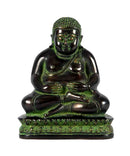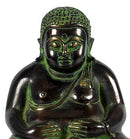In China Lord Buddha is known as "the laughing Buddha" and is usually represented as a rotund figure with a happy disposition. His Chinese name is Pu-tai Ho-shang or "Hemp-bag monk" who is originally a fertility figure and was known to bring "goodies" in his bag to local townsfolk, especially children. Later, he became a pre-incarnation of Maitreya. In Japan he is called Hotei and is one of the seven lucky gods. His figure is almost always seen carrying a cloth or linen sack, which never empties, and is filled with many precious items, including rice plants (indicating wealth), sweets for children, food, and the woes of the world. His duty is patron of the weak, poor and children. The brass statue carved out by the artist depicts a tubby, laughing bald man in robes with a largely exposed potbelly stomach that signifies happiness, good luck, and plenitude. The stomach is also considered the seat of the soul in Chinese mythology and so the large stomach can be taken as an allegory for his open heartedness. He most certainly is a loving and cheerful character, strikingly similar to Santa Claus in the West. It is believed that placing his statue at home or business places brings fortune.
Description
In China Lord Buddha is known as "the laughing Buddha" and is usually represented as a rotund figure with a happy disposition. His Chinese name is Pu-tai Ho-shang or "Hemp-bag monk" who is originally a fertility figure and was known to bring "goodies" in his bag to local townsfolk, especially children. Later, he became a pre-incarnation of Maitreya. In Japan he is called Hotei and is one of the seven lucky gods. His figure is almost always seen carrying a cloth or linen sack, which never empties, and is filled with many precious items, including rice plants (indicating wealth), sweets for children, food, and the woes of the world. His duty is patron of the weak, poor and children. The brass statue carved out by the artist depicts a tubby, laughing bald man in robes with a largely exposed potbelly stomach that signifies happiness, good luck, and plenitude. The stomach is also considered the seat of the soul in Chinese mythology and so the large stomach can be taken as an allegory for his open heartedness. He most certainly is a loving and cheerful character, strikingly similar to Santa Claus in the West. It is believed that placing his statue at home or business places brings fortune.
Payment & Security
Your payment information is processed securely. We do not store credit card details nor have access to your credit card information.




